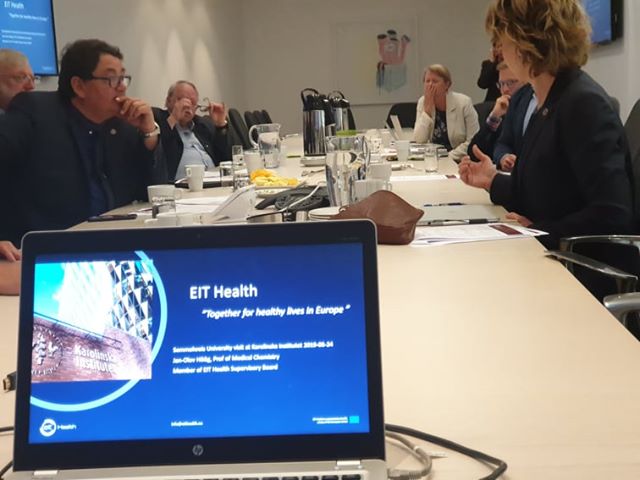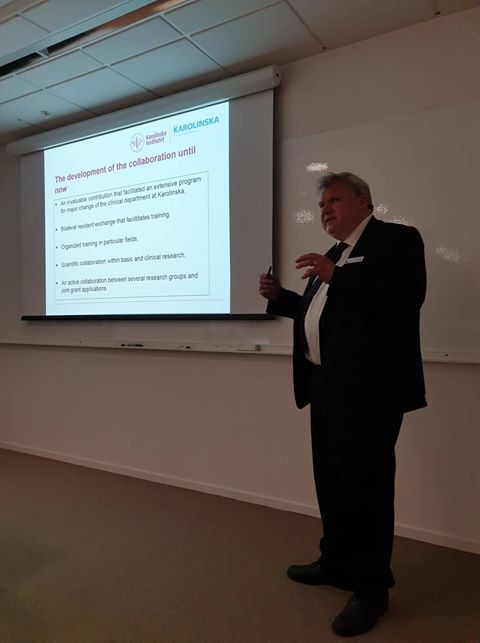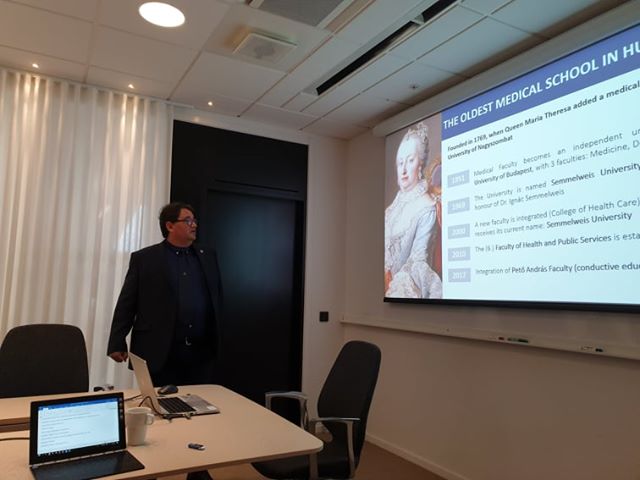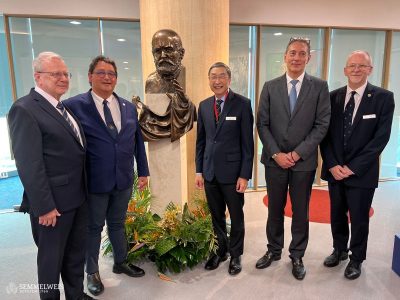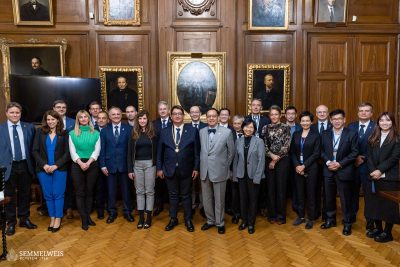Dr. Béla Merkely, Rector visited Karolinska Institute at the end of June. The primary aim of the visit was to institutionalise and raise the already existing relations to a higher level. The delegation, led by Dr. Béla Merkely, Rector was made up of Dr. András Kiss, Director of the 2nd Department of Pathology, Dr. András Matolcsy, Director of the 1st Department of Pathology and Experimental Cancer Research and Dr. Marcel Pop, Director of International Relations.
The cooperation between Semmelweis University and Karolinska Institute started over a decade ago and has been noteworthy in the fields of pathology and cardiology in the past few years. Other platforms of cooperation have been created under the auspices of EIT Health and Eurolife, of which both institutions are members.
The delegation was received at a meeting by Dr. Ole Petter Ottersen, President of Karolinska Institute, Dr. Annika Östman Wernerson, Academic Vice-President, Dr. Mikael Björnstedt, Director of the Centre for Pathology and Cytology, professor and recipient of Semmelweis University’s Doctor Honoris Causa award, Dr. Jan-Olov Höög, Head of the International Office of EIT Health, Dr. Patrik Blomquist, a representative from the innovation company of Karolinska Insitute and Monika Berge, international coordinator.
During the meeting both universities were presented in detail, with special focus on the current innovative developments and curriculum development. The president of Karolinska Institute introduced their strategic goals and vision for the next 10 years, which involves internationalisation as a priority area.
„Being specialised universities, the two institutions share a lot of things in common despite the structural differences. In 2014, the number of joint papers written as part of research projects involving both institutions was 26, which rose to 46 by 2018. I hope that the future holds more opportunities for cooperation and joint publication,” Dr. Ole Petter Ottersen said.
Dr. Béla Merkely spoke about the internationalisation strategy of Semmelweis University.
„Nurturing the collaboration and strengthening joint projects with Karolinska Institute are part of a dynamic development that aims to make Semmelweis University one of the best 100 universities in the world. Our curriculum development is compatible with the development implemented at Karolinska Institute, which emphasizes the internationalisation of education and encourages student and staff mobility,” he said.
Possibilities of cooperation within the framework of the Eurolife Programme were also discussed in detail. Semmelweis University joined Eurolife in 2016, which is a network of nine prestigious European institutions of high reputation in life sciences. The programme promotes the building of collaborative research projects, joint postgraduate training programmes and the exchange of students and researchers by offering various grants.
The leaders of the two universities agreed on the relaunch of the Erasmus+ programme, which has been on hold for the past few years. The exchange programme would be made available for mainly PhD students and residents. Dr. Béla Merkely mentioned Semmelweis University’s determination to increase the involvement of Swedish students and would invite the students of Karolinska Institute to hold lectures within the framework of the Students’ Scientific Association.
According to Dr. Mikael Björnstedt, Director of the Centre for Pathology and Cytology the main areas of cooperation between the two universities are cardiology and pathology.
“Pathologists from Semmelweis University have made a considerable impact on our institution by greatly contributing to the development of pathology service at Karolinska University Hospital in the past 10 years. Moreover, there are extensive joint research projects going on in the fields of cardiology and pathology,” he said.
The meeting was followed by a tour at the Department of Pathology in the Karolinska University Hospital located in Solna. After the visit at the clinical department the delegation was invited to a bilateral discussion, where the details of the exchange programme in pathology were explained. The programme is coordinated by Dr. Mikael Björnstedt and Dr. Attila Szakos, chief physician at the Department of Pathology in Huddinge, and the Hungarian pathologists have an important part in its organisation. The exchange programme enables not only specialists but Hungarian pathology residents to work and study at Karolinska Institute, while pathologists from the Karolinska University Hospital can participate in haemato-, pulmonary- and neuropathology courses at Semmelweis University. The cooperation has already proved to be a success, and to further enhance the programme Dr. Béla Merkely suggested the establishment of a direct digital connection between the pathology departments of the two universities.
The most important result of the bilateral discussions held with Karolinska Institute is the institutionalisation of the cooperation between the universities. The success of the already existing cooperative projects have been recognised by the leaders of the two institutions and their importance was emphasized. Furthermore, they agreed to hold a Bilateral Karolinska-Semmelweis Symposium organised by the 1st Department of Pathology and Experimental Cancer Research in Budapest on 15-16 November, 2019.
Diána Módos, Directorate of International Relations
Photos: Directorate of International Relations; featured image: Karolinska Institute
Translation: Ágnes Raubinek
